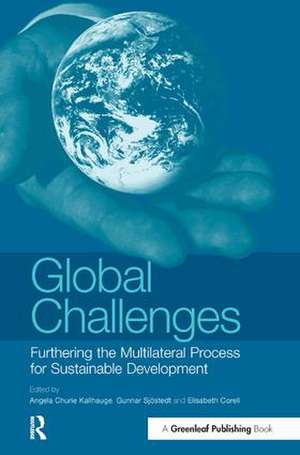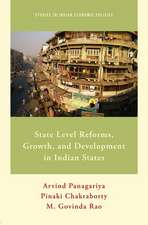Global Challenges: Furthering the Multilateral Process for Sustainable Development
Editat de Angela Churie-Kallhauge, Gunnar Sjöstedt, Elisabeth Corellen Limba Engleză Hardback – noi 2005
This book examines the challenges facing the global policy process for sustainable development as it continues beyond Johannesburg into the future. It combines a forward outlook with a historical perspective in tracing the evolution of selected cross-cutting themes on the agenda of the three conferences, the institutions and formal results of the process, and the actors and their patterns of interaction over time. The focus is on the decision-making dimension – the multilateral negotiations-which can be seen as the development over time of a pattern of interlinked political activities.Global Challenges has four operational objectives: first, to define the ongoing process that formally began with the Stockholm Conference in 1972 and evolved towards its latest major manifestation at the WSSD; second, to present some dynamics of the Stockholm–Rio–Johannesburg (SRJ) process by exploring the themes identified; third, to introduce an approach on how to consider the outcomes of this process as a way of reflecting on what the process has actually accomplished; and, finally, to discuss lessons learned for theory and practice from this exercise. The practical lessons include reflections on how the continued SRJ process should best be organised and supported into the future.
The book takes a uniquely broad outlook and interdisciplinary approach in addressing important lessons relating to the emergence of substantive issues as well as to process and institutional dynamics. It is a bridge-building exercise from academic analysis to long-term strategic thinking in environmental regime building.
Global Challenges provides a new perspective on the continuing and increasingly complex global environment and development policy process and analyses the interlinkages between the process, trends and cross-cutting issues that set the conditions for the global efforts to achieve sustainable development. It will be essential reading for academics and practitioners interested in seeing the big picture of the global challenges facing people and planet in the 21st century.
Preț: 496.11 lei
Nou
Puncte Express: 744
Preț estimativ în valută:
94.93€ • 99.37$ • 79.01£
94.93€ • 99.37$ • 79.01£
Carte tipărită la comandă
Livrare economică 31 martie-14 aprilie
Preluare comenzi: 021 569.72.76
Specificații
ISBN-13: 9781874719519
ISBN-10: 1874719519
Pagini: 320
Dimensiuni: 156 x 234 x 24 mm
Greutate: 0.77 kg
Ediția:1
Editura: Taylor & Francis
Colecția Routledge
Locul publicării:Oxford, United Kingdom
ISBN-10: 1874719519
Pagini: 320
Dimensiuni: 156 x 234 x 24 mm
Greutate: 0.77 kg
Ediția:1
Editura: Taylor & Francis
Colecția Routledge
Locul publicării:Oxford, United Kingdom
Public țintă
PostgraduateCuprins
ForewordI. William Zartman, School of Advanced International Studies, The Johns Hopkins UniversityIntroduction1. The multilateral process for sustainable development: past, present and futureAngela Churie Kallhauge, Royal Institute of Technology, Stockholm, Sweden, and Elisabeth Corell and Gunnar Sjöstedt, Swedish Institute of International Affairs2. What did the World Summit on Sustainable Development (WSSD) accomplish? Suggestions for an outcome assessmentGunnar Sjöstedt, Swedish Institute of International AffairsPart 1: Institutions and the development of the process3. The road to Rio: early efforts on environment and developmentBjörn-Ola Linnér, Linköping University, Sweden, and Henrik Selin, Boston University, USA4. The negotiating system of environment and development: a ten-year reviewPamela Chasek, Manhattan College, USA5. A commission will lead them? The UN Commission on Sustainable Development and UNCED follow-upLynn M. Wagner, International Institute for Sustainable DevelopmentPart 2: Actors and their interplay6. A tale of three cities: developing countries in global environmental negotiationsAdil Najam, Tufts University, USA7. Friends and foes: industrialised countries in multilateral environmental negotiationsDuncan R. Marsh, United Nations Foundation, USA8. Three decades of NGO activism in international environmental negotiations: who influences NGOs?Wagaki Mwangi, Syracuse University, USA9. Street-wise provocations: the Global Justice Movement's take on sustainable developmentPeter Doran, Research Fellow, Queen's University, Belfast; Research Officer, Northern Ireland Assembly, Belfast10. Partnerships for sustainable development: the role of Type II agreementsClaire Norris, Consultant, UKPart 3: Process functions/cross-cutting themes11. Knowledge processes in decision-making on sustainability: challenges for the futureElisabeth Corell, Swedish Institute of International Affairs, and Göran Sundqvist, Göteborg University, Sweden12. Financing for sustainable developmentKonrad von Moltke13. Capacity development for the environment: North and SouthStacy D. VanDeveer, University of New Hampshire, USA, and Ambuj D. Sagar, Harvard University, USA14. Making the link: synergies in international regime governanceAngela Churie Kallhauge and Lisa van Well, Royal Institute of Technology, Stockholm, SwedenConclusion15. An evolving sustainable development regimeGunnar Sjöstedt, Swedish Institute of International Affairs, and Lisa van Well and Angela Churie Kallhauge, Royal Institute of Technology, Stockholm, Sweden
Notă biografică
Angela Churie-Kallhauge, Gunnar Sjöstedt, Elisabeth Corell
Descriere
Focusing on the World Summit on Sustainable Development held in Johannesburg, this book presents a perspective on the continuing global environment and development policy process and analyses the inter linkages between the process, trends and cross-cutting issues that set the conditions for the global efforts to achieve sustainable development.










